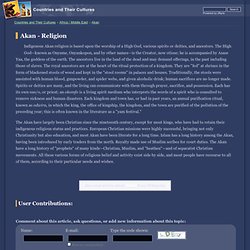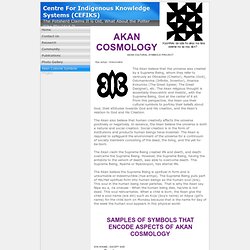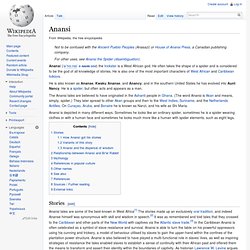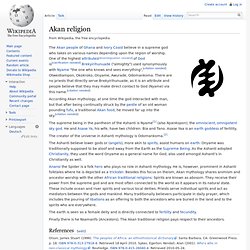

Religion - Akan. Indigenous Akan religion is based upon the worship of a High God, various spirits or deities, and ancestors.

The High God—known as Onyame, Onyankopon, and by other names—is the Creator, now otiose; he is accompanied by Asase Yaa, the goddess of the earth. The ancestors live in the land of the dead and may demand offerings, in the past including those of slaves. The royal ancestors are at the heart of the ritual protection of a kingdom. They are "fed" at shrines in the form of blackened stools of wood and kept in the "stool rooms" in palaces and houses. Traditionally, the stools were anointed with human blood, gunpowder, and spider webs, and given alcoholic drink; human sacrifices are no longer made. The Akan have largely been Christian since the nineteenth century, except for most kings, who have had to retain their indigenous religious status and practices. Akan Cosmology. Hye anhye - Unburnable The Akan believe that the universe was created by a Supreme Being, whom they refer to variously as Oboadee (Creator), Nyame (God), Odomankoma (Infinite, Inventor), Ananse Kokuroko (The Great Spider; The Great Designer), etc.

The Akan religious thought is essentially theocentric and theistic, with the Supreme Being, God at the center of it all. From this perspective, the Akan use their cultural symbols to portray their beliefs about God, their attitudes towards God and His creation, and the Akan's relation to God and His Creation. The Akan also believe that human creativity affects the universe positively or negatively. In essence, the Akan believe the universe is both a natural and social creation. The Akan claim the Supreme Being created life and death, and death overcame the Supreme Being.
The Akan believe the Supreme Being is spiritual in form and is unburnable or indestructible (hye anhye). Holy Spirit cathedral, Accra Kerapa God Son Sacrifice Lamb Household. Anansi. Anansi (/əˈnɑːnsi/ ə-NAHN-see) the trickster is a West African god.

He often takes the shape of a spider and is considered to be the god of all knowledge of stories. He is also one of the most important characters of West African and Caribbean folklore. He is also known as Ananse, Kwaku Ananse, and Anancy; and in the southern United States he has evolved into Aunt Nancy. He is a spider, but often acts and appears as a man. The Anansi tales are believed to have originated in the Ashanti people in Ghana. Anansi is depicted in many different ways. Stories[edit] Anansi tales are some of the best-known in West Africa[1] The stories made up an exclusively oral tradition, and indeed Ananse himself was synonymous with skill and wisdom in speech.[2] It was as remembered and told tales that they crossed to the Caribbean and other parts of the New World with captives via the Atlantic slave trade.[3] In the Caribbean Anansi is often celebrated as a symbol of slave resistance and survival.
Akan religion. The Akan people of Ghana and Ivory Coast believe in a supreme god who takes on various names depending upon the region of worship.

One of the highest attributes[disambiguation needed] of God is[clarification needed] Brekyirihunuade ("almighty") used synonymously with Nyame "the one who knows and sees everything",[citation needed] Otweidiampon, Okokroko, Onyame, Awurade, Odomankoma. There are no priests that directly serve Brekyirihunuade, as it is an attribute and people believe that they may make direct contact to God (Nyame) via this name. [citation needed] According Akan mythology, at one time the god interacted with man, but that after being continually struck by the pestle of an old woman pounding fufu, a traditional Akan food, he moved far up into the sky. [citation needed] The supreme being in the pantheon of the Ashanti is Nyame (also Nyankopon), the omniscient, omnipotent sky god. The creator of the universe in Ashanti mythology is Odomankoma.
References[edit] See also[edit] Nyame.